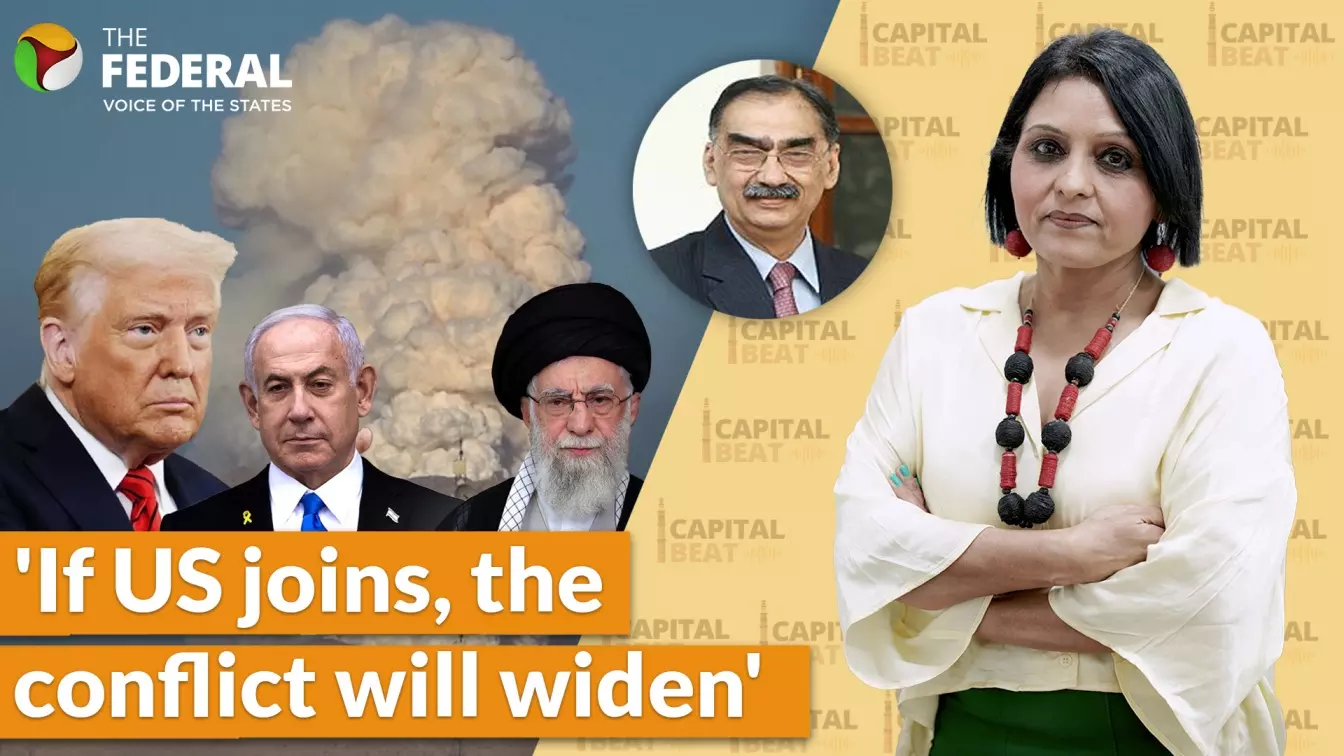
Vivek Katju interview
Will be dangerous if US joins Iran-Israel conflict: Vivek Katju
Israel's conflict with Iran may spiral further, says ex-envoy Katju, who also warns Netanyahu could pull US in and spark regional chaos; can escalation be avoided?

In this episode of Capital Beat, The Federal's Neelu Vyas talks to former diplomat Vivek Katju on the Israel-Iran conflict, even as the two countries exchange attacks for the eighth consecutive day.
With US President Donald Trump issuing ultimatums and hosting Pakistan’s army chief, the geopolitical stakes have grown larger. Katju explains why de-escalation is unlikely and what Trump’s actions mean for South Asia and the Islamic world. Here are excerpts from the interview:
Do you see any signs of de-escalation in the Israel-Iran conflict?
No. Netanyahu has gone too far to walk back now. His stated objective is to eliminate Iran’s nuclear bomb-making capability.
On the other hand, Trump has drawn a red line: Iran should not even enrich uranium — something that even the Obama-era deal allowed up to 3.67 per cent. Iran hasn’t agreed to this. And Israel's attacks have already killed top Iranian military leaders and hit nuclear and economic facilities. So, no, I don’t see signs of de-escalation.
Also read: Israel-Iran conflict LIVE: European ministers to hold talks with Iran
What happens if Trump joins the war?
That would be dangerous. Until now, it’s a bilateral battle — Israel vs Iran. Arab states are letting both sides use their airspace but staying uninvolved. If the US joins, the circle widens.
Demonstrations might erupt in Arab countries. Iran could retaliate against American bases, ships, and interests in the Strait of Hormuz. The scale and consequences would be far greater.
What’s the role of Iran-aligned militias in this scenario?
I doubt they can inflict major damage on American interests. Their capacities are limited. Iran might try to broaden the conflict by hitting US targets, but that’s speculative.
Also read: Trump, Netanyahu acting in tandem to subdue Iran?
Right now, Iran is defending, and Israel is on the offensive.
What about Trump-Asim Munir meeting? Could Pakistan play a role?
It’s hard to say definitively. The US doesn’t need Pakistan’s help at sea — its navy is formidable. Nor does it need Pakistani airspace or bases like it did in Afghanistan. Iran is not landlocked.
So, militarily, Pakistan’s utility is limited.
But, in case, Iran descends into chaos and peacekeeping is required, Pakistan might be tapped. They’re a major Islamic state and could offer boots on the ground — though they’d be reluctant. Mostly, the US wants Pakistan to be muted in criticism and diplomatically aligned.
So was this meeting just diplomatic theatre?
No, it’s significant. A US President hosting a foreign army chief at a White House lunch is extraordinary.
It’s rare. This was a clear gesture. Why? One, to re-energize US diplomacy in Pakistan. Two, to monitor and manage Pakistan’s growing proximity with China. And three, to maintain balance in South Asia, even as India remains central to the US Indo-Pacific strategy.
Also read: Pak leads war against global terror: Army Chief Munir tells Trump, US officials
How does Imran Khan figure in all this?
He must be very upset. Trump’s lunch with Asim Munir sends a signal — the US is engaging the military leadership, not the jailed former PM.
Earlier talk about the US pressuring for Imran’s release clearly hasn’t materialised. It’s a diplomatic snub.
You mentioned Pakistan plays to Trump’s ego. How?
Asim Munir seems to have done that skillfully. Trump has a huge ego, and the Pakistanis have offered to “mediate”.
Meanwhile, India was clear. After Modi’s 35-minute conversation with Trump, India categorically said there’s no mediation and reiterated its stance on Pakistan and terrorism.
Did India handle Trump effectively?
Yes. Vikram Misri, our foreign secretary, clarified everything — India doesn’t accept mediation. We set the record straight. Trump may continue boasting about preventing nuclear war, but we’ve said our piece and don’t need to react every time he speaks. That’s the diplomatic way.
Also read: Discussion | Ceasefire drama: Did the US mediate? India says no
Coming back to Iran-Israel conflict, what if Netanyahu targets Ayatollah Khamenei directly?
That would be an extreme and dangerous move. It would inflame not just Iran, but much of the Islamic world, including Sunni countries who might otherwise not support Iran. It would evoke massive anger. However, I don’t see that causing regime change in Iran.
Chaos, yes. But regime change? No.
Why not regime change?
Iran has no ready political forces or alternative leadership structures to replace the clerical system. The state apparatus has been built since 1979 to uphold the current order. Removing Khamenei won’t collapse the regime. His position would simply be filled by the Council of Guardians.
There’s no real democratic tradition in Iran to fall back on.
Any final thoughts on how to deal with Trump?
You have to deal with him as he is — unpredictable, imprecise, often delusional. He changes his mind constantly. You can’t manage him with conventional diplomacy. But the best approach is to be firm once and then ignore the theatrics. He’ll be around for the next 3.5 years, and the world must learn to navigate that reality.
The content above has been generated using a fine-tuned AI model. To ensure accuracy, quality, and editorial integrity, we employ a Human-In-The-Loop (HITL) process. While AI assists in creating the initial draft, our experienced editorial team carefully reviews, edits, and refines the content before publication. At The Federal, we combine the efficiency of AI with the expertise of human editors to deliver reliable and insightful journalism.

